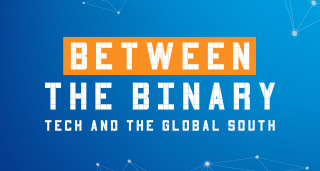Between the Binary is a limited series podcast highlighting the priorities, prospects, and challenges of technology in the Global South through the voices of experts in and from the Global South. Scroll down to hear new episodes in this podcast series hosted by John H. McArthur Research Fellow Elina Noor, Director of Political-Security Affairs and Deputy Director, Washington, D.C. Office at the Asia Society Policy Institute.
'Between the Binary' is a play on three concepts in the digital age: of societies that either fit within or straddle the Global South/Global North divide (defined here to refer to developed countries geographically located in the southern hemisphere or marginalized peoples in high-income economies north of the equator); of stakeholders in a landscape increasingly underwritten by the binary code of 1s and 0s.; and, of countries caught in the middle of a trending technological rupture.
By 2100, more than 90 per cent of the world’s population is projected to live outside Europe and North America. Most will live in Asia and sub-Saharan Africa, presenting substantial market opportunities. Yet current deliberations on technology inadequately address the needs and aspirations of this majority – let alone how stakeholders in these parts of the world should be able to determine the way tech impacts their lives. If a large part of the future lies with the people of Asia and Africa, it seems only fair to expect the governance structures – the norms, rules, and international legal frameworks – of technology to reflect the perspectives, expectations, and value-systems of the world’s majority.
Between the Binary seeks to amplify the viewpoints of this majority by unpacking technology’s intersections with history, gender, power, the economy, and behavioural psychology with a mix of established and next-generation guests from Asia, Africa, Latin America and the Caribbean, the Pacific Islands, and North America. Through these conversations, this podcast aims to improve understanding of the prospects and challenges of digitalization and equity in the Global South, as well as identify areas of convergence and co-operation within the Global South and with the Global North.
*Here, the term Global South refers to developing countries, most of which are geographically located in the southern hemisphere. However, it also takes a more expansive conception of the term – as outlined by Chinmayi Arun – to include disenfranchised communities living both in “Southern” countries but also in economically developed countries in the “North”. This interpretation would account for, for example, indigenous populations in both “Southern” and “Northern” countries but also other stakeholders who have had to resist marginalization, oppression, and/or injustice.

